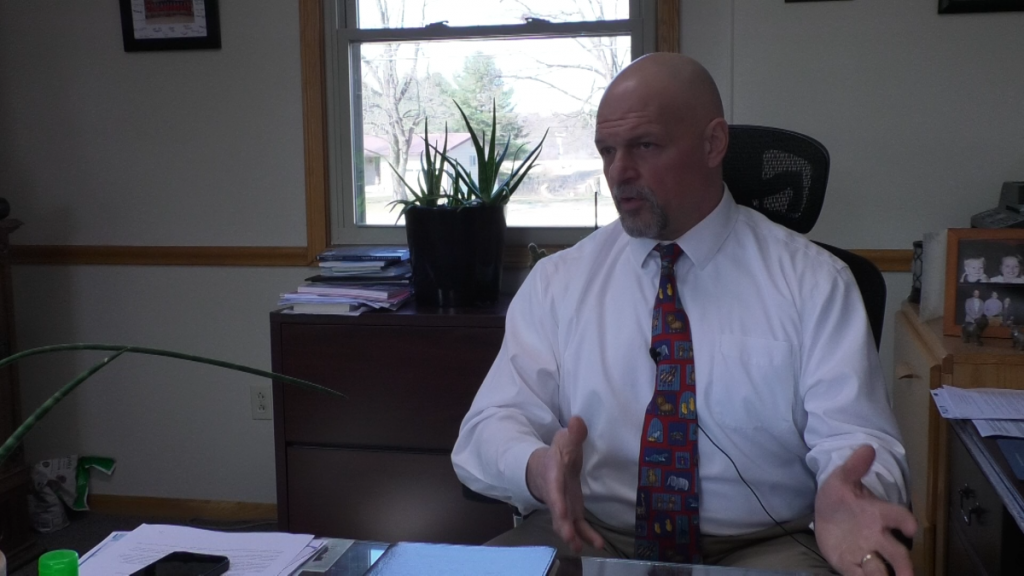News
Alexander Local Schools predicts layoffs and new fees for students if its operating levy fails again
By: Theo Peck-Suzuki | Report for America
Posted on:
ALBANY, Ohio (WOUB/Report for America) — The operating levy for Alexander Local Schools is one of Athens County’s most vexed political issues. And on March 19, it will be on the ballot again.
The levy failed five times before voters finally passed it in 2019 by a single vote. Voters chose not to renew it in November, prompting the district to put it on the ballot in next month’s primary.
According to Superintendent William Hampton, the levy accounts for 11% of the district’s overall budget.
The electoral difficulties come at a bad time for the district, which is facing a budget shortfall even if the levy passes. Hampton said rising costs, coupled with a new state funding formula that is extremely unfavorable to Alexander, have contributed to the problem.
“We can’t stay as we are. We know that,” Hampton said.
Under the state’s new formula, which passed in 2023 as part of House Bill 33, Alexander received a raise of about $13,000 this year. By comparison, the Athens City School District got a raise of over $1.6 million.
Hampton attributed the difference in part to the income levels in both districts. Alexander has the highest income levels of all districts in Athens County. That wealth will not help the school district, however, if it cannot collect taxes from its residents.

“It’s less painful for everyone. Still impacts the building and the operations, but it doesn’t impact the person,” Hampton said.
But this gentler approach won’t work if the levy fails.
“Without the levy, all bets are off and we’re gonna have to make some serious changes. And those will impact people,” Hampton said.
That could mean laying off teachers, which in turn would translate to larger, less manageable elementary school classes and a loss of specialized classes for high schoolers, including but not limited to AP and college credit plus courses.
Alexander curriculum director Megan Karr said Alexander offers courses like mathematical modeling and reasoning as an alternative to a traditional Algebra II course. Providing that level of course variety depends on having enough staff.
Nor are teachers the only ones Hampton said would suffer if the levy fails. Alexander requires no student fees for participation in athletics and other school activities. Without the levy, Hampton said, the district may need to start asking students to pay for their own equipment.
The free breakfasts the district provides for all students may also get cut to save money.
It’s not entirely clear why the Alexander levy is such a fraught issue. Most school levies in southeast Ohio pass when they come up for renewal. Alexander was the notable exception in November, as it has been in other elections.

Hampton attributed the loss in November in part to frustration within the community over the removal of his predecessor. Her ouster by the school board not long after the pivotal 2019 levy vote drew widespread condemnation and may have persuaded voters to vote no in order to express their discontent.
However, that doesn’t explain why the levy failed five times even before the former superintendent was removed.
Hampton hopes that the more residents understand the stakes, the more they’ll come out to support the levy. He and other levy supporters throughout the district have been working hard to get their message across.
One voter, who declined to provide his name, expressed frustration that the district never seems to learn its lesson.
“They didn’t like the result so they just kept doing it,” he said, likening the district’s behavior to “a pesky mosquito buzzing around.”
But the district’s outreach has won at least one voter over. Albany resident Billie Stark said a district representative came to speak with her seniors group not long ago. She found the district’s arguments persuasive and wasn’t impressed when a member of her group tried to object.
“I’m gonna vote for it, because kids are the future,” Stark said.

